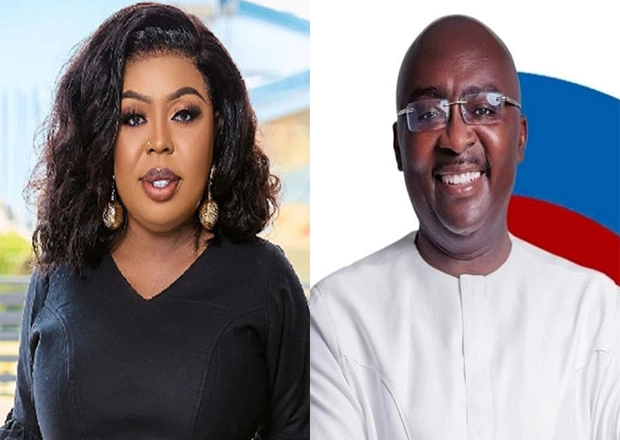The contentious relationship between Ghanaian socialite Afia Schwarzenegger and Member of Parliament Kennedy Agyapong took an unexpected turn during the 33rd-anniversary celebration of the NPP-USA branch. A meeting between Afia Schwarzenegger and Vice President Dr. Mahamudu Bawumia led to a surprising plea from the Vice President, urging the socialite to cease her public attacks on political figures, particularly Kennedy Agyapong. This advice, according to Schwarzenegger’s recounting on a TikTok Live session, sparked a strong reaction from her, expressing shock and disbelief at Dr. Bawumia’s intervention. This incident sheds light on the complex interplay of political relationships, personal feuds, and public image within the Ghanaian socio-political landscape.
The long-standing feud between Afia Schwarzenegger and Kennedy Agyapong is a well-documented and often volatile exchange of public insults and accusations. Dating back to 2016, the two have engaged in a war of words, frequently resorting to personal attacks and inflammatory language. Agyapong, known for his outspoken and often controversial statements, has publicly labeled Schwarzenegger a prostitute and accused her of bedwetting. Schwarzenegger, in turn, has accused Agyapong of orchestrating a physical attack against her involving soldiers, further escalating their acrimonious relationship. This ongoing feud has become a public spectacle, drawing both criticism and attention from various segments of Ghanaian society.
Dr. Bawumia’s intervention, advising Schwarzenegger to refrain from attacking Agyapong and other political figures, appears to be an attempt to mitigate the damaging public fallout of this ongoing feud. His plea, made during the celebratory context of the NPP-USA anniversary, highlights the party’s concern about the negative impact of such public disputes, particularly involving prominent figures within their ranks. While the specific motivations behind Dr. Bawumia’s intervention remain unclear, it underscores the importance of maintaining a positive public image and minimizing internal conflicts within a political organization.
Schwarzenegger’s reaction to Dr. Bawumia’s advice, expressing surprise and anger, further complicates the situation. Her public airing of this private conversation on social media adds another layer to the already complex dynamic between these individuals. Her expression of shock suggests a perceived entitlement to criticize political figures, perhaps viewing it as a form of social commentary or political activism. This incident raises questions about the boundaries of public criticism and the role of political figures in managing such disputes within their respective parties.
The incident also brings into focus the influence and reach of social media in contemporary political discourse. Schwarzenegger’s choice of platform to disclose this conversation, TikTok, a platform popular among younger demographics, further broadens the audience exposed to this interpersonal and political drama. This highlights the power of social media to amplify personal disputes, potentially impacting the public’s perception of involved individuals and their affiliated political organizations.
The encounter between Schwarzenegger, Dr. Bawumia, and the backdrop of the NPP-USA anniversary encapsulates the intersection of personal conflicts, political strategy, and public image management in the Ghanaian political scene. The long-standing feud between Schwarzenegger and Agyapong, amplified by social media, has become a public affair, drawing attention and scrutiny. Dr. Bawumia’s intervention, although intended to mitigate the damage, has inadvertently fueled further public discussion, highlighting the challenges of containing such interpersonal disputes within a political organization. The incident raises questions about the role of political leaders in managing internal conflicts, the boundaries of public criticism, and the influence of social media in shaping public perception of political figures.














